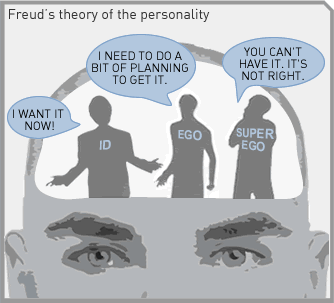
How do the id, ego and superego work together? While each of them defines human behavior, they also make up some of their favorite characters in the books they read. The id creates demands, the ego adds needs to reality, and the superego adds morality to the actions taken. Identity, ego and superego work together to create human behavior. The ego deals with reality and tries to respond socially to the wishes of the id. It also represents his most animal image. The identifier is the most basic part of the person. What is an example of id ego super ego?Įxamples of this, ego and superego. The ego thus acts as a mediator between the ID and the superego. The ID and the superego are two components of the Freudian model of the psyche. An emphasis on nurture all too often lets the employee (and supervisor) off the hook when it comes to making tough decisions which, if made, will lead to short-term pain for long-term gain for both the individual and the org.What is id superego and ego? The main difference between ID and superego is that ID contains basic needs, sexual urges and latent memories while superego contains moral consciousness. An employee's failure is not a bad thing. nurture) paint themselves into a corner and are ultimately less effective than those who understand the two and use them to the right degree at the right time.įailures are wonderful. Its been my experience that managers who prefer one or the other (nature v.

The 'knowledge worker's' weaknesses can often be invisible or even purposely hidden out of fear so as not to expose the employee to unveiled performance failure. Their struggle (work) is physical and productivity visible. I have a lot of respect for people who work in the trades. So, unless discipline (doing something you don't want to do but have to do in order to reach your goals) is either inherited or instilled, the worker struggles. As time passes, that distance from fight or fail mode becomes something the new worker can't relate to.

Their children saw that first hand and learned from it, mimicked it, had the benefit of knowing the lay of the land, and achieved more. In short, immigrants more often than not work under fight or fail conditions. There's a reason first generation Americans, on the whole, experience more success than their children. Navigating the edge between nature and nurture requires a high degree of self actualization and discipline. By being perceptive of surroundings and others’ emotions can we seek to emphasize our super-ego to become a better person and performer! Although difficult, with constant self-reflection and dedication, I believe anyone has the ability to change the way they think, act or feel. We all have an inherently unique view of our surroundings based on our upbringing and environments. Unless you are some type of psychic/clairvoyant, as markets and employee perceptions are constantly evolving, it would serve the company well to be proactive with gaining feedback of employees to better understand how effective current performance management is and how it can be improved. The Maslow’s hierarchy of needs diagram is a good resource to look at when thinking about what questions to ask employees in determining which need (besides physiological) is perceived as most important, to develop or augment a process that best bridges the gap between company goals and employee aspirations. Building trust with staff starts with open communication and demonstrating the organization’s commitment to further developing skills by proactively meeting annually or semi-annually to review objectives. Regarding the HR process, performance management, taking time to interview employees to understand not only how they work but what motivates them and what their innate desires are, is a crucial step in the planning process. The super-ego is that which drives us to seek continuous improvement and to better understand what is socially acceptable. He surmises that Id is the innate, unconscious needs of a person, and ego includes all actions performed to satisfy those unconscious needs. Whether you believe more in nature or nurture, we can all learn from the Sigmund Freud’s psychoanalysis, specifically the psychic apparatus of Id, ego, and super-ego.


 0 kommentar(er)
0 kommentar(er)
